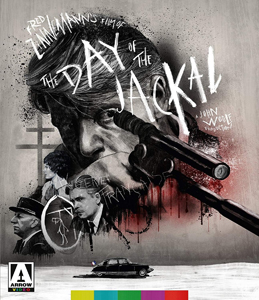“The Day of the Jackal” (1973) could be called a film without style, as it soberly presents the procedures of the titular assassin (Edward Fox) and the investigations by the French government, fronted by Detective Lebel (Michael Lonsdale). But director Fred Zinnemann, in his third-to-last film, glories in the efficiency of the professions shown on screen, plus filmmaking itself.
Propelled by crisp editing from Ralph Kemplen (rightly nominated for an Oscar), “Jackal” is structured to engross a viewer. We get a little of the Jackal’s (and his allies’) moves, then a little of Lebel’s (and his allies’) moves. A standout stretch of the film finds the Jackal murdering someone, changing his appearance, and sneaking away. We cut back to the household help’s leisurely failure to notice the lady of the house is dead, and we see how much progress the Jackal makes during that time.
He’s not superhuman, but he’s supremely good at his job; dare I say he’s admirable in his skill set, ability to plan, and ability to adjust on the fly. “Jackal” (mistitled because it chronicles more than a single day) eschews big emotional moments, and — while it is incidentally rich in characterization — every moment of Kenneth Ross’ screenplay (from Frederick Forsyth’s novel) is plot-driven.

“The Day of the Jackal” (1973)
Director: Fred Zinnemann
Writers: Kenneth Ross (screenplay), Frederick Forsyth (novel)
Stars: Edward Fox, Terence Alexander, Michel Auclair
Smart cat; even smarter mouse
Interestingly, Ross and Kemplen leave out some moments that other films would include. For instance, the Jackal sneaks into the hotel room of a lady he has courted (Delphine Seyrig’s Colette), and the next scene cuts ahead to them post-sex. Going into the scene, we would not have expected her to be receptive to him. Perhaps the skipping ahead is for decorum, but also it is one of “Jackal’s” many little surprises caused by mini-time jumps. It makes this deliberate film a little less obvious.
Set in the 1960s, “Jackal” starts with blunt, monotone narration about how the OAS intends to assassinate French president Charles de Gaulle. In this joint English-French production (with the actors always speaking English), the film’s and the viewer’s politics don’t much matter – which is why it still holds up today, and why the modernized miniseries remake (Nov. 7 on Peacock) should translate well. It will be interesting to see how the digital age replaces the paper trails of a half-century ago.
The OAS aims to kill the president for granting independence to Algeria, so it strikes me that the film nominally sympathizes with the French government. However, one could read bureaucratic incompetence and laziness as subtexts, namely in the boardroom sequences where Lebel answers to a dozen officials who seem to do nothing other than smoke.
While Lebel has been living out of his office to coordinate the search for the Jackal’s identity and whereabouts, one official has let himself be infiltrated by an attractive female OAS agent, Denise (Olga Georges-Picot), thus causing an information leak. And while Lebel never wavers from wanting to catch the Jackal, he’s a man of strong belief (if not conviction): Little snippets of dialog tell us he finds the darker, back-room methods of his government repugnant.

Because of these nuances and the raw fact that we always want the character we’re following to achieve their aims (something Hitchcock preached), I found myself on the side of the Jackal and Lebel simultaneously.
Sneaky character growth
In 2023, David Fincher made “The Killer,” entirely about the cold logistics of an assassin’s life, with the plot as an afterthought. I prefer “Jackal’s” approach: The plot drives the film, straight as a rail. As a natural side effect, we soak up the assassin’s day-to-day life and can imagine his inner emptiness.
We’re helped by the excellent performance by Fox, so good at portraying a charm toward women and men alike that only we as a viewer know is fake. Lonsdale, showing physical and mental exhaustion along with impressive professionalism in the face of a bureaucracy, also adds humanity. So do side characters such as Colette and Denise, women on different sides of the conflict and with different degrees of (intended) involvement.
So this clinical exercise sneaks in plenty of characterization, without sacrificing its initial style (or non-style) choice. Unavoidably, the cold presentation will turn off a cross-section of viewers, but I’m somewhat surprised to say I’m not among them. “The Day of the Jackal” is an engrossing and occasionally thrilling example of how smart criminals and smart detectives did their respective jobs in the 1960s.

